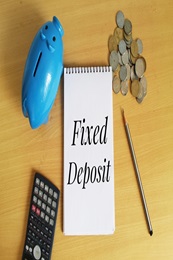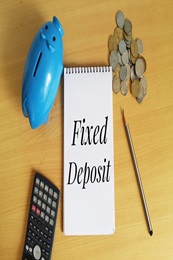How to Make the Right Renewal Choices on RD Maturity?
April 15, 2025

Recurring deposits (RDs) are popular savings option in India, offering a disciplined way to save money and earn interest over time. It is a type of deposit offered by banks where you can save a fixed amount every month for a predetermined period. The deposits earn interest at a fixed rate as in compounded every quarter, providing you with returns on your investment.
As your RD matures, you have several options to choose from. In this article, we will explore the different recurring deposit maturity options and guide you on making the best renewal choices.
What are the Various Renewal Choices on RD Maturity?
Withdrawal of Maturity Amount
Investors can withdraw the entire maturity value, which includes both the principal amount and the interest earned during the deposit period. This is the most straightforward option and is available without penalties after the maturity date
Renewal of Recurring Deposit
Many banks offer the option to renew the RD for another term under the same or different conditions. This allows investors to continue their savings plan without interruption. Renewal can often be done online or at a bank.
Auto-Renewal
Some banks provide an auto-renewal feature, where the RD is automatically renewed for the same duration upon maturity unless instructed otherwise by the investor. This is convenient for those who wish to maintain their investment strategy effortlessly.
Extension of Tenure
Investors may have the option to extend their RD for an additional period beyond the original maturity date. This could be beneficial if they want to continue earning interest without withdrawing their funds immediately.
Conversion to Fixed Deposit
After maturity, some banks allow investors to convert their RDs into Fixed Deposits (FDs). This can be a better option if interest rates are higher on FDs compared to RDs, though it may not always be the case.
Reinvestment of Interest Earnings
Investors can choose to reinvest their interest earnings into a new RD or other investment options. This strategy can help maximise returns by compounding interest on previously earned interest.
Opening a New Recurring Deposit
After maturity, investors can opt to open a new RD using the maturity amount plus interest earned. This is suitable for those looking to continue saving in a structured manner.
Making the Right Choice On RD Maturity
While choosing from the various recurring deposit maturity options keep in mind your financial goals, current market conditions, and personal circumstances. By evaluating the available options—renewal, withdrawal, extension, conversion, or donation—you can make an informed choice that aligns with your overall financial strategy.
Factors to Consider
- Interest Rates: Compare current interest rates and opt for RDs with the best interest rates. This is important as rates may vary significantly and impact your returns.
- Financial Goals: Assess your short-term and long-term financial goals. If you need liquidity, withdrawing might be better; if you're focused on saving, renewal or extension could be preferable.
- Tax Implications: Be aware that interest earned on RDs is taxable, which should be factored into your overall financial planning.
- Consultation with Advisors: Consider consulting with a financial advisor or bank representative to understand the implications of each option thoroughly and make an informed decision based on your unique circumstances.
- Interest rates: If you believe that interest rates will fall, it is best to renew your RD for a longer term - say for 5-years.
- Assess Your Cash Flow: Ensure you can commit to the monthly deposits for the duration of the RD. Make sure you have sufficient liquidity outside of your RD for emergencies.
Final Thoughts
Understanding recurring deposit maturity options is crucial for making informed financial decisions. Whether you choose to withdraw your funds, renew your RD, or convert it into an FD depends on your financial goals and immediate needs. By considering the benefits of each option and conducting proper research, you can maximise your returns and achieve your financial objectives.
Start small, dream big! Invest in Ujjivan Small Finance Bank’s Recurring Deposit and enjoy higher interest rates! Save for your long- and short-term goals with our RD and live a stress-free financial life. Start investing with just ₹100!
FAQs
1. What are the various recurring deposit maturity options that are available?
The various recurring deposit maturity options that are available include renewal, withdrawal, extension of tenure, conversion to fixed deposits or opening a new RD in another bank. While there are plenty of RD renewal choices, it must align with your financial objectives.
2. Should I intimate my bank on RD maturity?
Most of the RDs are credited automatically on maturity. However, if you want renewal, conversion to FD etc., you must intimate the bank.
3. Are there tax implications on RD maturity?
The interest earned on RD maturity is fully taxable. It falls under the category of "Income from Other Sources." You are required to declare the interest earned while filing your income tax returns.
4. Why should I choose my recurring deposit maturity options carefully?
Carefully considering your recurring deposit maturity options allows you to maximise returns, align investments with financial goals, and avoid penalties while maintaining flexibility.
5. Can I convert my recurring deposit into a fixed deposit after maturity?
Yes, many banks offer the option to convert a matured recurring deposit into a fixed deposit. This allows you to benefit from higher interest rates typically associated with FDs.
6. What happens if I do not renew my recurring deposit at maturity?
If you do not renew your recurring deposit at maturity, most banks will automatically credit the maturity amount to your linked savings account.
7. What is the minimum tenure for a recurring deposit?
The minimum tenure for a recurring deposit is usually 6 months while the maximum tenure is 10 years.
Latest Blogs

Telangana Housing Board & KPHB Colony: A Guide to Affordable Urban Housing in Hyderabad
March 14, 2025
As Telangana continues its rapid urbanisation journey, two key housing entities—Telangana Housing Board (THB) and Kukatpally Housing Board Colony (KPHB)—have played critical roles in shaping the state's real estate ecosystem.

Does Checking CIBIL Score Frequently Lower Your Credit Points?
April 07, 2025
Imagine you're planning to apply for a home loan, a credit card, or even a car loan. Naturally, you want to ensure your CIBIL score is in good shape before proceeding.

Explained: Can NRIs Buy an Agricultural Land in India?
April 03, 2025
Real estate investment is often a top priority for Non-Resident Indians (NRIs) looking to retain strong financial ties to India.

How to Improve Your CIBIL Score from 600 to 750: A Step-by-Step Guide
April 02, 2025
Your CIBIL score is like your financial reputation—banks check it before approving loans or credit cards. If your score is hovering around 600, you might face difficulties in securing credit or may get loans with higher interest rates.

What Happens When You Leave Your Savings Account Unused?
April 01, 2025
Imagine waking up one day to find that your hard-earned money is locked away and inaccessible. Sounds stressful, right? This is precisely what happens when you leave your Savings Account inactive for too long.





